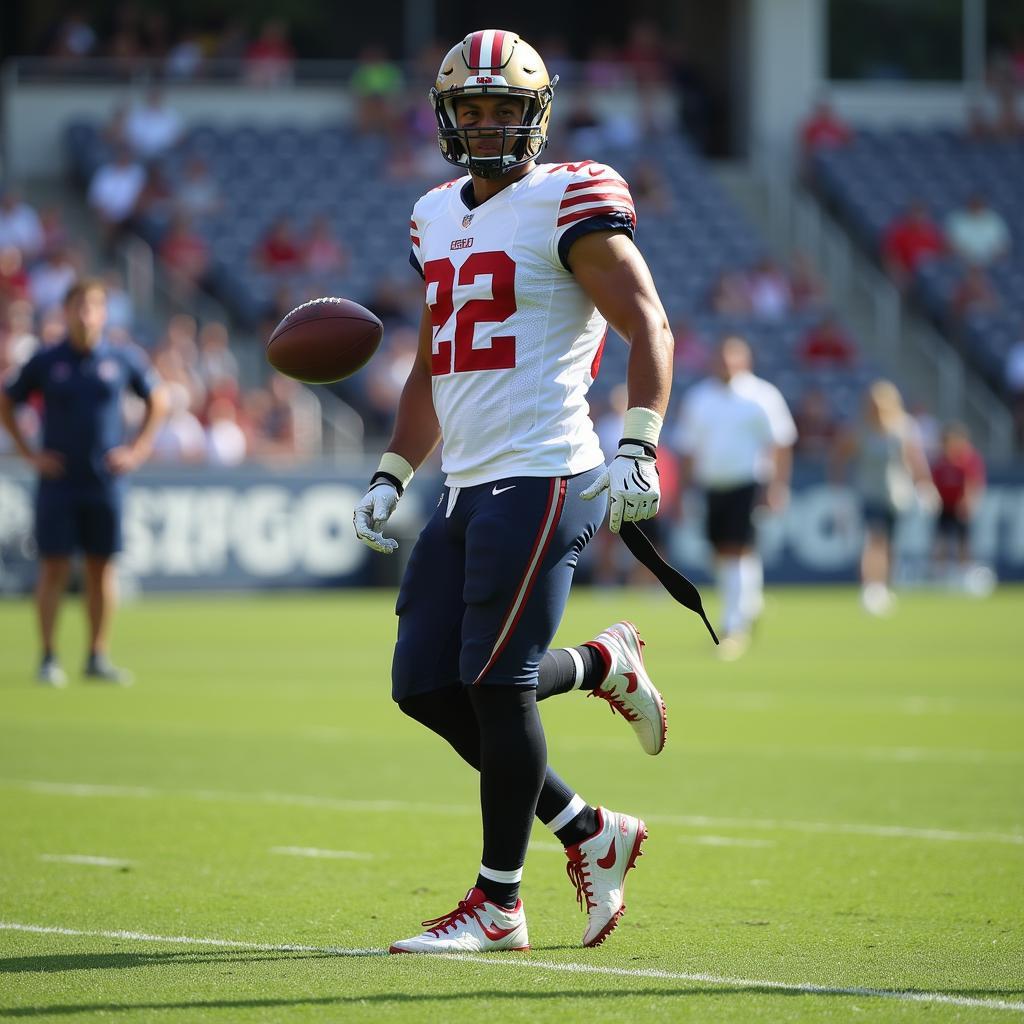Causes of Muscle Cramps in Football Players
November 9, 2024Muscle cramps in football, a sudden, involuntary, and painful contraction of a muscle, can be a real game-changer. They can strike any player, regardless of their fitness level, and disrupt performance. Understanding the causes of these cramps is crucial for prevention and effective management. Let’s dive into the science behind this common football ailment.
Dehydration: A Major Culprit in Muscle Cramps
Dehydration is arguably the most common cause of muscle cramps in football players. Sweating profusely during intense activity depletes the body of fluids and electrolytes, particularly sodium, potassium, magnesium, and calcium. These electrolytes play a vital role in muscle function, and their imbalance can trigger painful cramps. Imagine running for 90 minutes under the scorching sun, losing vital minerals with every drop of sweat. Your muscles, starved of these essential nutrients, begin to contract uncontrollably, leading to the dreaded cramp.
Muscle Fatigue and Overexertion: Pushing the Limits
Muscle fatigue resulting from prolonged or intense exercise is another key contributor to muscle cramps. When muscles are pushed beyond their capacity, they become more susceptible to these painful contractions. This is often seen towards the end of a match or during periods of extra time, when players are physically exhausted. Think of your muscles as elastic bands. Stretch them too far or for too long, and they’re bound to snap back painfully.
Inadequate Conditioning and Preparation: The Importance of Training
Proper conditioning is paramount in preventing muscle cramps. Players who haven’t adequately trained or haven’t gradually increased their training intensity are at a higher risk. Their muscles are less prepared for the demands of a football match and are more prone to fatigue and cramping. Pre-season training, regular exercise, and gradual increases in intensity are vital for preparing muscles for the rigors of the game.
 Football player stretching to prevent muscle cramps
Football player stretching to prevent muscle cramps
Improper Stretching and Warm-up: Setting the Stage for Success
Stretching and warming up properly before a match or training session are crucial for preventing muscle cramps. These activities prepare the muscles for exertion and improve their flexibility, reducing the risk of injury and cramping. A dynamic warm-up, incorporating movements that mimic game situations, is particularly effective.
Underlying Medical Conditions: When to Seek Professional Help
While most muscle cramps are benign and easily managed, certain underlying medical conditions, such as nerve compression, mineral deficiencies, and certain medications, can also contribute to their occurrence. If you experience frequent or severe muscle cramps, it’s important to consult a doctor to rule out any underlying health issues.
“Cramps are a common enemy on the football pitch, but with the right preparation and awareness, they can be managed effectively,” says Dr. Emily Carter, a leading sports physician. “Hydration, proper conditioning, and adequate stretching are key elements in the fight against muscle cramps.”
Conclusion: Winning the Battle Against Muscle Cramps
Understanding the causes of muscle cramps in football players is crucial for prevention and effective management. By staying hydrated, maintaining optimal fitness, warming up and stretching adequately, and addressing any underlying medical conditions, players can significantly reduce their risk of experiencing these painful interruptions to their game. Remember, a well-prepared athlete is a cramp-free athlete!
FAQs
- What is the best way to treat a muscle cramp? Gently stretching the affected muscle and applying heat or ice can help relieve the cramp.
- How much water should a football player drink during a match? Fluid intake should be individualized, but a general guideline is to drink small amounts of water or sports drinks frequently throughout the match.
- Are there any specific foods that can help prevent muscle cramps? Foods rich in potassium, such as bananas and potatoes, can be beneficial.
- Can wearing compression garments help reduce muscle cramps? Some studies suggest that compression garments may offer some benefit in preventing muscle cramps.
- What is the difference between a muscle cramp and a muscle strain? A muscle cramp is a sudden, involuntary contraction, while a muscle strain is an injury to the muscle fibers.
- Should I continue playing if I experience a muscle cramp during a match? It’s generally best to stop playing and address the cramp to avoid further injury.
- When should I seek medical attention for muscle cramps? If your cramps are severe, frequent, or accompanied by other symptoms, it’s important to consult a doctor.
Need more assistance? Contact us! Phone: 0396443476, Email: [email protected] or visit us at 23 Tháng 3, Đắk Nia, Gia Nghĩa, Đắk Nông, Việt Nam. We have a 24/7 customer service team. Check out our other articles on injury prevention and performance enhancement on our website. You can also find information on nutrition for athletes and recovery strategies.